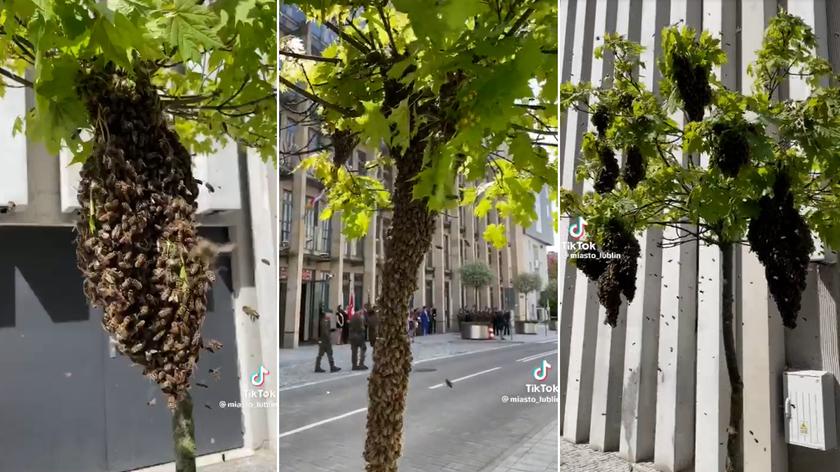Residents of Lublin received a shock when they found a tree in the city centre had been completely occupied by a swarm of bees. After images of the incident went viral, a local beekeeper has assured the public that the animals have been returned to their hives and pose no threat.
One video, which shows a small tree in the city centre completely overrun by the bees, was posted on TikTok by the official account of Lublin on 2 May, which in Poland is a holiday known as National Flag Day. In the background, soldiers and civilians can be seen taking part in celebrations.
@miasto_lublin W cyklu spotkania w centrum miasta, których się nie spodziewasz 🐝🐝🐝 #Lublin #Pszczoły
“The phenomenon we were dealing with is called swarming. If beekeepers do not control it, once a year – in the period from May to July – a number of bees will fly out from each hive in order to establish a new colony,” beekeeper Marcin Sudziński, told news service TVN24.
Sudziński runs an apiary located on the roof of the Centre for the Meeting of Cultures in Lublin, from which the bees escaped. Lublin is famous for beekeeping and there are several apiaries located within the city, such as on the roofs of the Catholic University of Lublin and the Vivo shopping centre.
The Center for the Meeting of Cultures, however, is home to the largest urban apiary in Poland.
A number of Polish cities are installing beehives on rooftops, with the bees providing environmental benefits as well as honey for locals https://t.co/B04k5pW8dh
— Notes from Poland 🇵🇱 (@notesfrompoland) March 18, 2021
“Once in a while, a situation like this happens. The last one took place in 2020,” explained Sudziński. “During this flight, the bees make stops in trees or on chimneys, for example. Eventually, they settle in the place they choose as their destination.”
Sudziński described how he was eventually able to catch the “escapees” without too much trouble, explaining how he did not even wear a beekeeper hat or gloves during the rescue mission.
He first fenced off the area with tape to keep away passers-by, before collecting the bees into a box, in which he placed a beekeeping frame. He then brought the animals back to the building and returned them to their hives on the roof.
@miasto_lublin Materiał, który zamieściliśmy 2 maja wzbudził ogromne zainteresowanie. Postanowiliśmy o to co się wydarzyło zapytać opiekuna pszczół. Koniecznie zobaczcie jego odpowiedź, a jeśli temat tego, jak pszczoły żyją w mieście Was zaciekawił, z chęcią opowiemy o tym więcej 🐝🐝🐝 #Lublin #Pszczoły #PszczołyWMieście
Sudziński also appeared in a follow-up video posted by Lublin on TikTok in which he gave the public advice on what to do if they encounter a swarm of bees colonising a location.
He stressed that swarming is a natural occurrence as it is the bees’ way of reproducing and reassured the public that bees will not seek confrontation with people if they do not panic.
“What do we do in a situation like this? We keep calm. And we have to remember that if we keep calm, the bees will stay calm too. In a situation like this the best thing to do is to contact a beekeeper. And if there is no such beekeeper, then simply call the emergency services.”
The number of bee colonies in Poland has risen 54% over the last decade to reach two million, thanks in part to a state programme supporting beekeepers.
Bees' value to the ecosystem as pollinators is estimated to be worth 5bn zloty (€1.1bn) https://t.co/ElISOc2o2T
— Notes from Poland 🇵🇱 (@notesfrompoland) May 30, 2022
Main image credit: miasto_lublin/TikTok

Anna Hackett is an assistant editor at Notes from Poland. She is a recent graduate of European Studies from Trinity College Dublin and has had previous journalistic experience with the Irish Independent News & Media group.




















